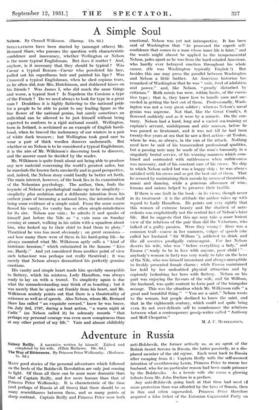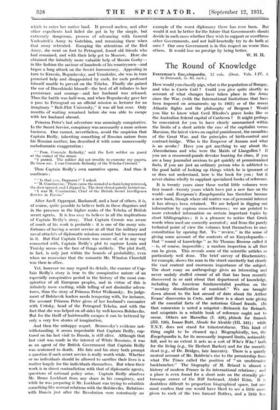Adventure in Russia
Sidney Reilly. A narrative written by himself. Edited and completed by his wife. (Elkin Mathews. 10s. 6d.)
MANY good stories of the personal adventures which followed on the heels of the Bolshevik Revolution are only just coming to light. Of them all there can be none more dramatic than that of Captain Reilly, and few more human than that of Princess Peter Wolkonsky. It is characteristic of the time (and perhaps of Russia at all times) that there should be so many resemblances between them, and so many points of sharp contrast. Captain Reilly and Princess Peter were both
anti-Bolshevik, the former actively so, as an agent of the British Secret Service in Russia, the latter passively, as a dis- placed member of the old regime. Each went back to Russia after escaping from it ; Captain Reilly with the self-avowed intention of overthrowing Lenin, Princess Peter to rescue her husband, who for no particular reason had been made prisoner by the Bolsheviks. As a heroic wife she earns a glowing tribute from Mr. Jobn Buchan in a preface.
Any anti-Bolshevik going back at that time had need of more protection than was afforded by the laws of Russia, then in flux and often superseded. Princess Peter therefore acquired a false ticket of the Estonian Cozat- nunist Party on which to enter her native land. It proved useless, and after other expedients had failed she got in by the simple, but extremely dangerous, process of advancing with General Yudenitch's Army to Gatchina, and remaining there when that army retreated. Escaping the attentions of the Red Army, she went on foot to Petrograd, found old friends who had remained, and with their help got to Moscow. Here she obtained the infinitely more valuable help of Maxim Gorky— in like fashion the saviour of hundreds of his countrymen—and began a long attack on the Soviet bureaucracy. Appealing in turn to Krassin, Boguslaysky, and Yenukidze, she was in turn promised help and disappointed by each, for each professed himself unable to prevail on the Tcheka. Finally she gained the ear of Dzerzhinski himself—the best of all tributes to her persistence and courage—and her husband was released. Thus the battle was half-won, and when Boguslaysky gave her a pass to Petrograd on an official mission as lecturer for an imaginary " Balt-Flot University," it was all but over. Only months of waiting remained before she was able to escape with her husband abroad.
Princess Peter's last adventure was amusingly conspirative. In the Secret Service, conspiracy was necessarily a more serious business. One cannot, nevertheless, avoid the suspicion that Captain Reilly, inheriting something of Russian nature from his Russian mother, has described it with some unnecessarily melodramatic exaggeration :
" ' Pass, Comrade Relinsky,' said the Lett soldier on guard at the corner of the street.
"I passed. The soldier did not trouble to examine my papers. He knew me. I was Comrade Relinsky of the Tcheka-Criminel."
Thus Captain Reilly's own narrative opens. And thus it continues :
" Is that you, Dagmara ? ' I asked.
" `M. Constantine.' There came the sound of a chain being removed, the door opened, and I slipped in. The door closed quietly behind me.
"I was M. Constantine, Chief of the British Secret Intelligence Service in Russia."
After Azeff, Opperput, Bazhanoff, and a host of others, it is, of course, quite possible to believe both in these disguises and in the presence in the higher ranks of the Tcheka of British secret agents. It is less easy to believe in all the implications of Captain Reilly's story. That Captain Cromie was aware of much of his work is probable : it is one of the many mis- fortunes of having a secret service at all that the military and naval attaches of diplomatic missions cannot but be concerned in it. But that Captain Cromie was aware of, or in any way connected with, Captain Reilly's plot to capture Lenin and Trotsky seems on the face of things unlikely. The plot itself, in fact, is only just within the bounds of probability, even when we remember that the romantic Mr. Winston Churchill was then in office.
Yet, however we may regard its details, the essence of Cap- tain Reilly's story is true to the conspirative nature of an especially conspirative period in the history of the most con- spirative of all European peoples, and in virtue of this is infinitely more exciting, while telling of not dissimilar adven- tures, than the story of Princess Peter Wolkonsky. Its judge- ment of. Bolshevik leaders needs tempering with, for instance, the account Princess Peter gives of her husband's encounter with Uritsky, head of the Petrograd Tcheka, and with the fact that she was helped on all sides by well-known Bolsheviks.
But for the thrill of hairbreadth escapes it can be bettered by only a very few stories of imagination.
And then the unhappy sequel. Brunovsky's evidence not- withstanding, it seems improbable that Captain Reilly, cap- tured on his last visit to Russia, is still alive. Although that last visit was made in the interest of White Russians, it was as an agent of the British Government that Captain Reilly was sentenced to death. His fate and his story both prompt a question if such secret service is really worth while. Whether or no individuals should be allowed to sacrifice their lives is a matter largely for the individuals themselves. But when their work is in direct contradiction with that of diplomatic agents, questions of national policy arise. Captain Reilly absolves Mr. Bruce Lockhart from any share in his conspiracy, and while he was preparing it Mr. Lockhart was trying to establish something like normal relations with the Bolsheviks. Relations with Russia just after the Revolution were notoriously an example of the worst diplomacy there has ever been. But would it not be better for the future that Governments should decide iri such cases whether they wish to support or overthrow other Governments, and not half-heartedly try to do both at once ? Our own Government is in this respect no worse than others. It would lose no prestige by being better.
W. H. H.































 Previous page
Previous page